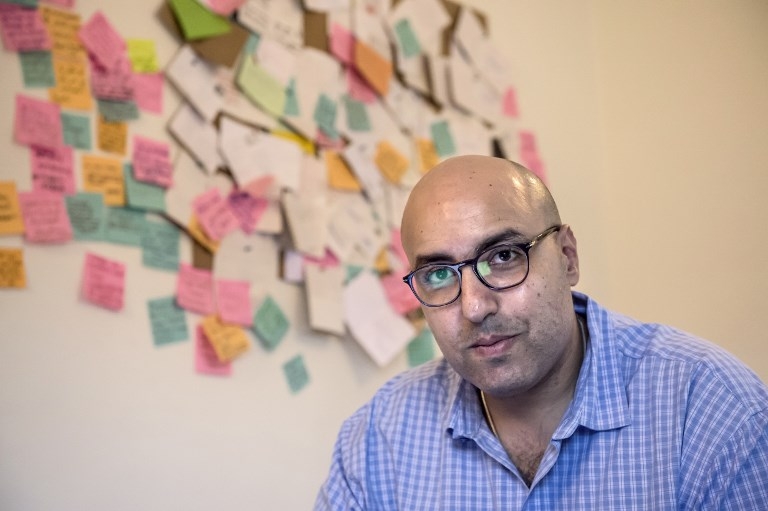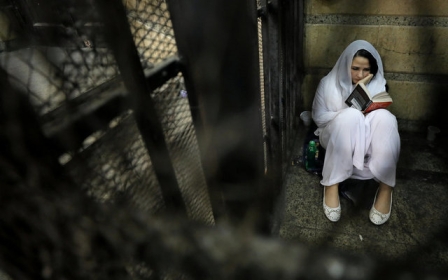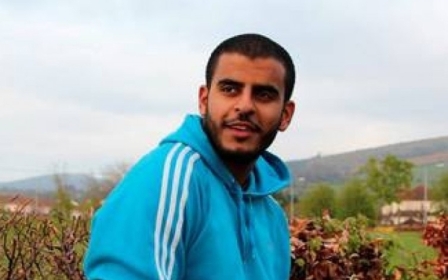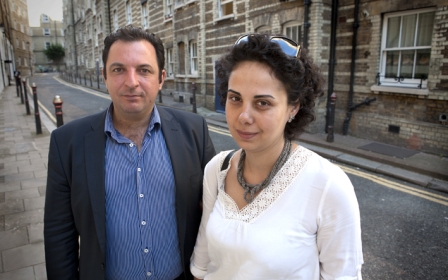Egyptian activist banned from collecting human rights award

An Egyptian human rights activist recognised with a prestigious award for his work was unable to accept the prize in person because of a travel ban over government allegations he is a threat to national security.
Mohamed Zaree, 37, is one of several Egyptian human rights activists banned from travel over their work, part of a wide-scale crackdown on dissent in the country.
The Martin Ennals award is given by leading human rights organisations, including Amnesty International and Human Rights Watch, to recognise outstanding work done at great personal risk.
This award belongs to the tens of thousands of Egyptian citizens who have been tortured, imprisoned, disappeared or killed over the last six years
- Mohamed Zaree, Egyptian human rights activist
Zaree’s seat at the University of Geneva ceremony was empty but his wife, Shymaa Abd El Aziz, and two daughters were presented the award by Kate Gilmore, the UN's deputy high commissioner for human rights.
Zaree told the AP news agency that he hoped the award would protect him and other Egyptian human rights activists, most of whom face prosecution under sweeping laws targeting those accused of “undermining national unity”.
“We are all banned from travelling, and some have had their bank accounts frozen,” he said. “There is a danger for myself and my colleagues, but I believe the biggest danger is when the victims of human rights violations are denied their last hope.”
He dedicated the award to the thousands of Egyptians he said had been tortured or imprisoned since veteran ruler Hosni Mubarak was overthrown in 2011.
“I do not view this honour as recognition of my work alone,” Zaree said.
“Instead, this award belongs to the tens of thousands of Egyptian citizens who have been tortured, imprisoned, disappeared or killed over the last six years for nothing more than standing up to corruption and tyranny through peaceful means.”
In Geneva, award founder Hans Thoolen celebrated Zaree's "heroic" behaviour in "holding the fort" nearly alone amid the crackdown on human rights organisations.
"There was a very clear understanding that the Egyptian regime seems to be emboldened by the lack of action in the UN and by major states," he said.
Zaree heads the Egypt country office for the Cairo Institute for Human Rights Studies, which focuses on the Arab world.
The group has been based in Tunisia since 2014 after Egypt the crackdown on human rights intensified with the 2013 military coup overthrowing elected president Mohamed Morsi.
Egyptian President Abdel-Fattah al-Sisi, who led Morsi's overthrow, has presided over the heaviest crackdown in decades. Authorities have jailed tens of thousands, mainly supporters of Morsi but also several prominent secular activists.
The group has handled high-profile cases, including that of Egyptian-American charity worker Aya Hijazi, who had established a foundation to support street children in 2013 and was jailed on charges of child abuse.
The charges were dismissed by human rights groups and US officials. Hijazi was released and allowed to return to the US earlier this year after nearly three years in prison.
The award, named after a former head of Amnesty International, is among the most prestigious in the field.
Other finalists included El Salvador transgender activist Karla Avelar, and the FreeThe5KH group - five human rights defenders who were recently released after more than a year in pre-trial custody in Cambodia.
New MEE newsletter: Jerusalem Dispatch
Sign up to get the latest insights and analysis on Israel-Palestine, alongside Turkey Unpacked and other MEE newsletters
Middle East Eye delivers independent and unrivalled coverage and analysis of the Middle East, North Africa and beyond. To learn more about republishing this content and the associated fees, please fill out this form. More about MEE can be found here.




